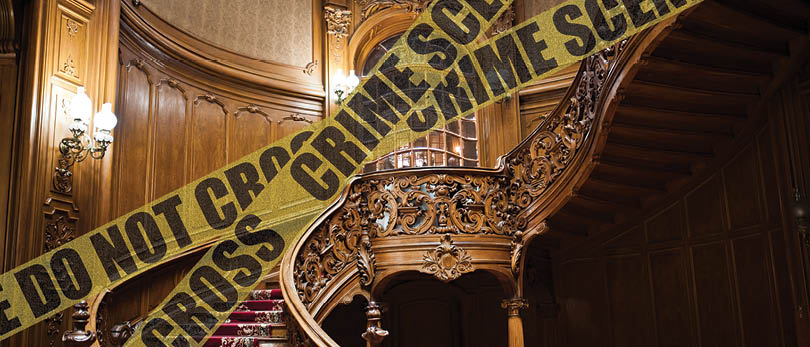CRSs explain how to handle homes with unsavory histories
By Regina Ludes
Sylvia “Elsie” Foster, CRS, president of Foster Realty in Waianae, Hawaii, has seen her fair share of problem homes.
These include everything from former drug houses to homes that were the site of suicides and murders. She recalls one particular home in her area where an off-duty prison guard killed his mother in the garage.
“Several months after the incident, the family approached me about listing the home, but I turned it down. Several years later, it came back to me as a real-estate owned (REO) property,” recalls Foster. After the bank appraised the property and priced it accordingly, the home eventually was sold to an owner-occupant for roughly $60,000 less than the market rate at that time.
According to Realtor.com, 20% of Americans said they would be willing to live in a home where a murder took place. Another 17% said they would live in a home believed to be haunted, while 46% would live in the haunted home if it was purchased at a discount.
Most people are turned off by the thought of living in a home believed to be occupied by ghosts or where a murder has taken place. However, in markets with limited inventory, stigmatized homes are drawing interested buyers who are willing to overlook their sordid past in the hopes of snagging a deep discount. Stigmatized homes present a unique challenge for agents who must overcome negative public perceptions about the property to reach the right buyer. By focusing on positive aspects of the property and properly disclosing past negative events, CRSs can succeed in finding suitable buyers for stigmatized homes.
Marketing stigmatized homes
The National Association of REALTORS® defines a stigmatized property as: “A property that has been psychologically impacted by a negative event that occurred on the site that left no visible evidence that it occurred.” Those negative events could be a violent death, suicide, drug house, alleged hauntings or a notorious previous owner. Even the home’s location near a murder house or cemetery can make it stigmatized.
The majority of stigmatized properties Foster has dealt with were previous drug houses that became REO properties. Foster says they often smelled and had suffered serious damage. “In some cases, the homes were in such poor condition, I would white box them—remove appliances and fixtures, give it a fresh coat of paint, remove the smell and show only the slab and white walls. That way buyers could do whatever they wanted with it,” she explains.
Foster says stigmatized homes don’t stay on the market long in her area because inventory in Hawaii is so low. Investors are snatching up properties almost as soon as they become available. “The worse a property is, the more buyers seem to want it,” Foster says.
Though she is not required by state law to disclose the home’s stigmatized history, Foster says she discloses the information anyway, even in the case of a natural death. “A stigmatized home is a material fact because it can affect the value of the property,” she explains.
State Disclosure
Most states do not require disclosure of events that stigmatized a property.
In California, agents must disclose if a death occurred in the home within the past three years.
In Alaska and South Dakota, they must disclose if the event took place within the past year.
In New Jersey, disclosure is required if the death was connected to some physical condition of the home, such as a collapsed roof which killed the occupant.
Disclose discreetly
Only once in her 45-year real estate career did Jane Fairall, CRS, associate broker with Palmer House Properties in Atlanta, Georgia, have to deal with a stigmatized property. At the time, she was the managing broker for another real estate company when a seller approached one of her agents about listing the home.
“When the seller informed my agent that there had been a suicide in the basement within the past year, she came to me for advice. I didn’t know what to do. It was not required to be disclosed, and I had never encountered anything like that before,” recalls Fairall. “I knew from my experience, though, that if you don’t disclose something, people will find out about it anyway.”
After meeting with the seller and the rest of her team, Fairall decided not to disclose the event until a buyer’s agent approached them about the house. Not long after that, the first interested buyer came along. Fairall discreetly shared the home’s history with the buyer’s agent, who discussed it with the buyer. The buyer did not have a problem with the suicide, and the house closed quickly at the market rate, Fairall says.
“It’s better to disclose those details up front because otherwise someone else could tell the buyer what happened,” Fairall says. “I would handle the situation the same way today.”
Address rumors
Sometimes, superstitions and rumors of untimely deaths can give a house a bad reputation. Agents should be preparedto address those concerns.
In Hawaii, when rumors circulated that a condo unit she was renting out for a client was haunted, Foster brought in a kahuna, or Hawaiian priest, who confirmed there were no spirits living there and performed a blessing. Once neighbors saw this blessing, it stopped the rumors, Foster says.
Fairall says when dealing with rumors, she does not acknowledge them either way. “If the buyer or their agent have concerns about a certain property, I advise them to search news articles, the internet and death records to find out if there’s any truth to the rumors,” she advises.
Focus on the positive
Even with a troubled past, stigmatized homes have some features that can be presented in a positive light. Though Foster’s stigmatized home was located off the main highway, it came with an upstairs balcony that provided a perfect, unobstructed view of the ocean. Likewise, if a drug house had been gutted, Foster helps buyers envision how they can make it their own.
Fairall takes a different approach by mentioning the negatives up front. “If you mention a negative aspect of the house before showing it, usually people will minimize it. They might say afterward, ‘Oh, that’s not so bad.’”
She has this advice for agents: “Get all the facts from the seller. Consult with your broker, then make sure everyone agrees on a strategy to market the house. If the seller doesn’t want to disclose the incident, you always have the option of not taking the listing.”
With the right marketing strategy and proper disclosure, agents can give stigmatized homes a fresh start.

Want more listings? Learn what top agents do to win more listings in the course “Creating Listing Abundance” at CRS.com.
Photo: iStock.com/ASphotowed/leolintang








